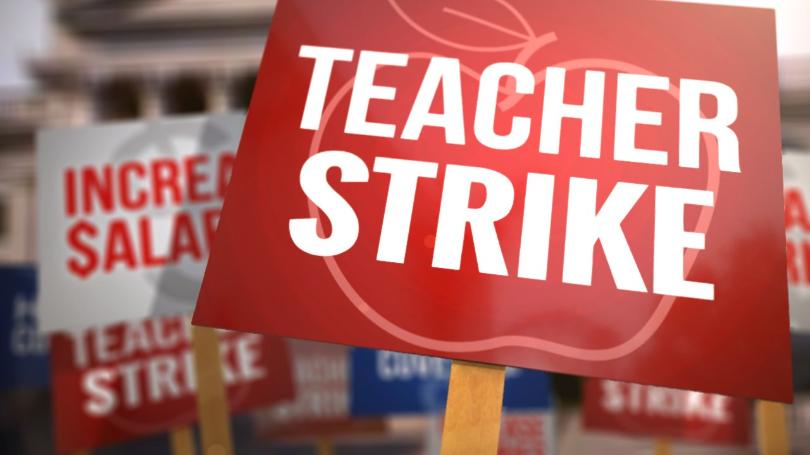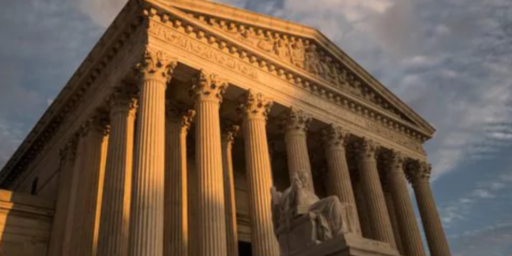West Virginia Teachers’ Strike Nets 5% Raise
We may about to see a wave of teacher strikes.

PBS (“West Virginia leaders reach deal to end 9-day teachers strike“):
Gov. Jim Justice and West Virginia’s Republican leaders tentatively agreed Tuesday to end the state’s nine-day teachers’ walkout by giving 5 percent raises to not just teachers, but all state workers.
To pay for it, lawmakers will seek to cut state spending by $20 million, taking funds from general services and Medicaid, Senate Finance Committee Chairman Craig Blair said.
“We have reached a deal,” Justice tweeted. “I stood rock solid on the 5% Teacher pay raise and delivered. Not only this, but my staff and I made additional cuts which will give all State employees 5% as well. All the focus should have always been on fairness and getting the kids back in school.”
The governor, union leaders and the House of Delegates had agreed last week to the 5 percent pay raise for teachers, who are among the lowest paid in the nation and haven’t had a salary increase in four years. But the Senate refused to go along, approving a 4 percent increase.
Some teachers cheered in the hallways of the Capitol after the governor tweeted the news. Others waiting inside the meeting room indicated that they’re wary of getting excited until House and Senate majorities approve the deal.
“We’ve been down this road before,” West Virginia Education Association President Dale Lee said. “The winners in this are the students of West Virginia and the educators across West Virginia who finally see a true investment in education.”
The union’s spokeswoman, Kym Randolph, said that if lawmakers quickly pass the legislation as they said Tuesday they intend to, teachers could be back at work Wednesday. “We just need to see it in writing,” she said.
Dave Schuler, pointing to a brewing teachers’ strike in Oklahoma, expressed sympathy:
You have to dig a bit for it but the issue is pay and I’m with the teachers on this one. They aren’t paid enough. Pay for a teacher in Oklahoma starts at $37,000 and tops out at $46,000 at the highest lane and seniority. Median household income in Oklahoma is $43,000. That means that most teachers in Oklahoma earn below median income. That’s not right. Plumbers in Oklahoma have a median income around the state’s median and can earn as much as $75,000.
Gregory Krieg notes that the teachers in West Virginia have a similarly strong case:
The strike, which began on February 22 when some 20,000 teachers hit the picket line, has now forced school closures in all of the state’s 55 counties. At stake are two apparently separate but deeply interwoven concerns: first, to secure a meaningful raise for educators whose compensation is among the lowest in the country and, second, though perhaps even more important, to come up with a fix for the Public Employees Insurance Agency, their embattled health coverage program.
Health care is a key element of the fight in West Virginia, where even the prospect of a modest pay hike is wiped out by declining benefits, which had until recently been a key draw to the public sector. Now, there are hundreds of teaching jobs unfilled — which further empowers the strikers, it’s worth noting — and increasingly strident demands for more robust health care spending. (Or, at the very least, a serious effort by lawmakers to stabilize funding after years of cuts.)The anger isn’t new. Outrage has been brewing for months, years. The Charleston Post-Gazette described a tinderbox of frustration at a public hearing in Charleston last November and a sense — as teachers and their local union leaders railed against low wages and cuts to the Public Employees Insurance Agency — that extraordinary measures would be required to reroute the debate.
Because of their cause and shrewd public appeals, the teachers actually managed to gain sizable support from their students and parents. We’ll see whether the legislature goes along with the raise.
Krieg notes that West Virginia and Oklahoma may be the start of a trend.
My longstanding position is that, unlike workers in the private sector, government employees shouldn’t have the right to strike. We hold a position of public trust and shouldn’t be able to use our offices to hold the public hostage. But that bargain has traditionally included a very competitive salary and benefits and employment guarantees unmatched in the private sector. It seems that the West Virginia legislature hasn’t been holding up its end of the deal.
UPDATE (16:33): The legislature has reportedly passed the necessary measure, ending the strike.






It’s almost as if a union is the only tool a working person has to get any sort of economic justice. Republicans have relentlessly attacked unions since Reagan’s day and, oh look, what a surprise: the middle class that used to be unionized but switched their allegiance to ‘the market’ are worse off, while the rich are far richer. One might almost suspect a cause-and-effect relationship.
I hope so. OK especially needs to get it’s funding priorities straight or they’ll continue to loose good educators by the truckload.
They better hurry before the non-activist SCOTUS moves to get rid of public unions.
James,
“My longstanding position is that, unlike workers in the private sector, government employees shouldn’t have the right to strike. We hold a position of public trust and shouldn’t be able to use our offices to hold the public hostage.”
The converse is that there needs to be a method to resolve open terms now bargained for, or the public employees are the hostages. I would be OK with no strikes only if there were to be binding arbitration or a similar means to resolve such issues.
@Moosebreath:
Agreed. In the case of West Virginia, the legislature has been reneging on the tacit bargain, effectively reducing teacher pay and benefit on a year-by-year basis. There has to be a recourse in extreme cases. But I don’t think holding schoolchildren hostage is the answer.
Then I guess the legislature shouldn’t have taken those children hostage by refusing to deal fairly. Without the right to strike, employees have no real power, their interests will always be sacrificed to those of the rich and powerful.
Power is the point. The rich have power. With a union and the right to strike, workers also have power. Without that right they are left to beg for scraps. Which is exactly where society is now – corporations are using their tax cuts to buy back stock and brushing some crumbs off the table for the dogs to lick up. The rich get richer, the working stiff gets poorer. The idea that the rich will ever voluntarily give up a penny is fatuous – that penny must be taken.
@michael reynolds: My contention is that public sector workers are simply in a different category. These teachers have enormous coercive power, not because of their irreplaceable skills, but because of their positions of public trust. Police, firefighters, air traffic controllers and others who provide essential services ought not to be able to hold the public hostage. They should be able to bargain collectively. Ideally, there would be some sort of arbitration process to handle disputes.
I only wish that West Virginia was an isolated example in the dealing with public employees of all stripes, but especially teachers. My experience is that nearly every government looks to the education budget when needing to “tighten its belt in hard times.” Alas, that’s where the money is–IIRC, 55% of it in Washington state, for example.
I note that the WV governor is going with cuts to social services and Medicaid. Well, the money’s got to come from somewhere. It’s too bad that the kid whose teacher just got a raise is now going to have to compete with 10 additional new kids for attention on his CPS file and for time at the health clinic, but you can’t make omelets without etc. …
@Just ‘nutha ig’nint cracker: Part of what’s happened is that Republicans have actually adopted their stated agenda at the state level in a way they haven’t nationally. Most states simply don’t allow budget deficits—their constitutions explicitly forbid it—and raising additional revenue through taxes is next to impossible. So, you either get cuts to spending—and, as you say, Education is where the money is at that level—or you get gimmicky taxes that ostensibly hit only outsiders (hotel fees, grabs of the income of athletes who happen to play a game in-state, etc.).
West Virginia legislators would claim that they are holding up their end of the deal — teachers have been getting paid, for instance, and sometimes they get paid so lavishly that they can afford to buy supplies for their own classrooms!
Either workers have a right to strike, or they have no power.
New York Times is reporting Gary Cohn is about to go on strike, if you catch my drift.
@James Joyner:
First, what does it mean to be “able to bargain collectively”, if you don’t have the right to strike, hence zero power in the negotiation? Second, there isn’t, never has been, and never will be any arbitration process of the kind you refer to. So that “ideal” doesn’t have much relevance.
Bottom line: what power should the workers in this instance (the work of teaching) actually be able to possess in your view. Because in general they have none, other than by striking. This particular instance demonstrates that in a particularly direct and striking (pun intended) way.
@Just ‘nutha ig’nint cracker:
This is the modern Republican Party. Tax cuts for corporations and the wealthy, and screw the contemptuous little guy whenever possible.
Perhaps, West Virginia should go out of business. Their GDP per capita is 48th. I was there in 2014 and was struck by how hard it is to drive around since the roads are forced to follow the topography, and this was in the summer. I did not see any vibrant industry in my casual visit. Sometimes the nicest things are just not viable. Consolidation with some neighbors makes sense.
If I were a young graduate from Morgantown, I’d head for Pittsburgh.
@Davebo: Yes, and pay is not the only problem. Try professional treatment: how about a duty free lunch period and a restroom break? Another problem is top heavy administration that gets huge raises.
James, honest question here. What is it about unions that turn the average conservative inside out with disgust? After all, conservatives seem to understand that if a CEO is incentivized to destroy a company in order to make their yearly bonus, then that CEO is justified in maximizing compensation. But nothing seems to make conservatives angrier than line workers getting above themselves and organizing for a slice of the pie.
As to where this question comes from, remember that 100% of the improvement in productivity since Ronald Reagan busted the Air Traffic Controller’s union has gone to management and investors. 100%. In almost thirty years, not one single percentage point has gone back to the workers.
Like everyone else here, I’m wondering where exactly James thinks underpaid, overworked, undersupported teachers get the leverage for effective collective bargaining, if they HAVE TO WORK FOR THE OFFERED WAGE NO MATTER WHAT.
They have the right to quit, and let someone else work for the offered wage while they try to find some other line of work? Is that really it?
Turn this around. There is (quite literally) no more important job than teacher, when it comes to America’s ability to compete and thrive in a global marketplace 20 years from now. And yet, the market wage and working conditions for teachers are somewhat worse than those for cable TV installers and garbage collectors. Do you seriously see no problem with this? Is the market always right in making long-term valuations? If so, are you equally opposed to environmental legislation?
@MarkedMan: Granting that I was just a teenager but I thought Reagan was absolutely right to fire the PATCO workers who refused his order to end their illegal strike. As federal employees, they simply lacked that right.
@DrDaveT: Many states and localities make it illegal for government workers to strike. The federal government does, too. I think that’s reasonable precisely because this isn’t about “the market.” There is no “market” in a public-public servant relationship. Governments compete with the private sector for employees, so have to provide pay and benefits sufficient to attract a workforce. But governments, outside a few odd cases, don’t make profits but rather require citizens to pay taxes under penalty of law.
Some states pay their schoolteachers quite handsomely and are able to attract a high percentage of top talent to enter the profession. Some states, sadly, do not. That’s highly problematic for a variety of reasons. But, aside from the fact that there are private schools (most of which pay very poorly) and that some teachers in STEM fields have more lucrative non-teaching options, there’s no market relationship with the employer.
@James Joyner:
Of course there’s a market. The teacher has something to offer – her labor – and the state or municipality pays her for that labor. Willing seller, willing buyer = market. From the perspective of the teacher there’s no fundamental difference between working for the city, working for a private school or working as a personal tutor. In each case the teacher offers what she has – her work – and someone pays her.
The difference only matters insofar as people like you are willing to assume that the market is defined top-down, by who is paying, and not bottom up, by who is being paid. From the perspective of the teacher, they want to earn more, someone is paying them, someone is ignoring their calls for better wages, so they go on strike. You’ve stated your belief that state employees should not be able to strike, but not really explained why and I submit that there is no real rationale, just certain unfounded assumptions.
@James Joyner:
You do realize that you just contradicted yourself in the space of 1.5 sentences there, right? See @michael reynolds‘s reply for details.
The economists I work with would not only have burst out laughing at that statement, they would also have then disregarded anything else you ever said.
@James Joyner:
Really? A “high percentage” of people who could have been doctors or physicists or CFOs or successful entrepreneurs, but instead chose to teach in public schools? Which utopian states are these?
@michael reynolds: @DrDaveT: Governments compete for employees with the private sector and other governments, so there’s certainly a market in that sense. My argument is that, because they rely on taxation rather than customers for their revenue stream, they’re in a very different position. Traditionally, government offers a guaranteed job—in a way a business can’t—and generous benefits but at the tradeoff of a civil service scale. Employees usually can’t negotiate for pay raises and, while they’re usually organized they’re denied the right to strike.
@DrDaveT: Some states invest much more in education than others, offering more competitive salaries while, typically, also requiring they have more demanding undergraduate preparation. They’re attracting and retaining better teachers. I have no idea what other professions they would otherwise have chosen but teaching school is attractive for a variety of reasons, especially to young women—helping kids, following their mother or grandmother’s footsteps, a schedule conducive to raising one’s own children, etc.
@James Joyner:
What other sense is there?
I have no idea where you got this odd idea that the source of funds has something to do with whether you are participating in a market. Would you also argue that there is no ‘market’ in billionaire-servant relationships, on the grounds that the billionaires are relying on interest from their inherited wealth, rather than on having to compete to earn it?